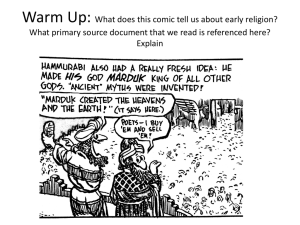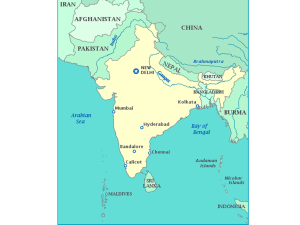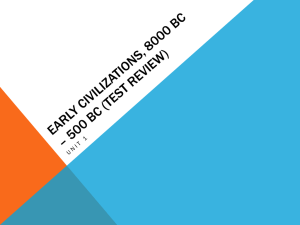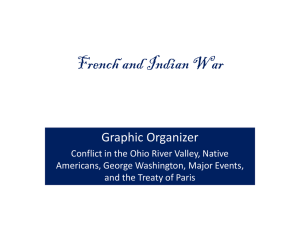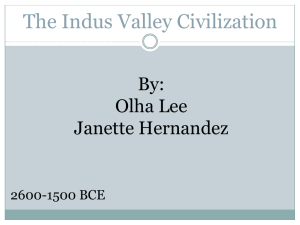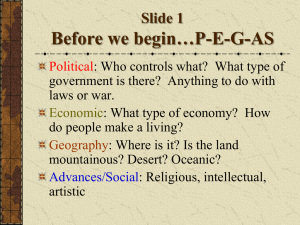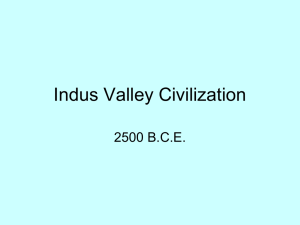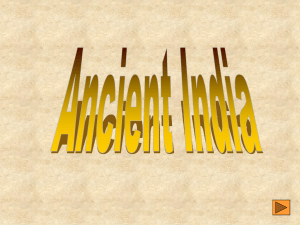Ancient River Valley Civilizations
advertisement
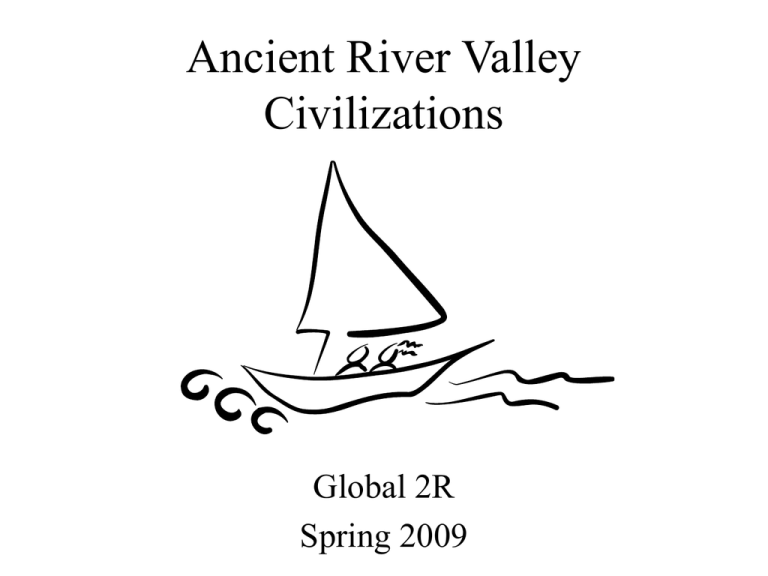
Ancient River Valley Civilizations Global 2R Spring 2009 Pre-history • Pre-historic = before written records • Two periods of pre-history to know – Paleolithic – Neolithic Pre-history • Paleolithic – (Old) Stone age period • Stone primary material for tools – Hunter-gathers – Nomadic lifestyle Pre-history • Neolithic Age – (New) stone age • Stone still primary tool material • Agriculture • Domestication of animals • Some settlement • Some nomadic groups Paleolithic Age 1st Agricultural Revolution Neolithic Age Neolithic Age People Start to Settle Develop Civilization Civilization • A form of culture, characterized by cities,specialized workers, complex institutions, record-keeping and advanced technology Civilization • To be a civilization, society must have a majority of these: – Cities Specialized labor – Government Science & tech – Religion Art – Taxes Social classes – Written language River valley Civilizations • Helpful Hint: – Know one of these cold – Be very familiar with a second – Have heard of a third Tigris & Euphrates • Located in modern Iraq • Known as Mesopotamia (land between 2 rivers) • Known as Fertile Crescent • Look for the only green in the brownish Middle east on the map • Rivers empty into Persian Gulf Tigris & Euphrates • The geography does not help – Unpredictable flooding – No natural barriers to invasion – Plenty of fresh water for farming and drinking – Access to trade/travel & cultural diffusion – Silt deposited by rivers Tigris & Euphrates • Geography does not help, but problems solved – For defense, walls of mud bricks were built – Trade of grain, cloth and tools brought in natural raw materials like stone, wood and metal Tigris & Euphrates • Main crops grown were barley & wheat • Surpluses produced led to development of different civilizations in the region Tigris & Euphrates • Cities associated with Mesopotamia – Sumer – Akkad – Babylon – Ur Tigris & Euphrates • Sumer – Polytheism – Run by soldiers – Temples called Ziggurats – Invented sail, plow, wheel & 1st to use bronze – Developed geometry & arithmetic Tigris & Euphrates • Sumer – Developed arches, columns, ramps – Developed cuneiform (wedge writing in wet mud which was allowed to dry) Tigris & Euphrates • Akkad – Sargon of Akkad conquered Sumer – Created world’s first empire – Dynasty lasted 200 years Tigris & Euphrates • Babylon – Based on Euphrates river – Empire hit peak under Hammurabi – Hammurabi’s Code Tigris & Euphrates • Hammurabi’s Code – Needed single, unified code of law to unify people – Written in stone – Placed throughout the empire – “eye for an eye” – Law applied to everyone, but applied differently to men/women & rich/poor Page 33 Written Law Codes • • • • • • 10 Commandments Hammurabi’s Code Draco’s Code 12 Tables Justinian’s Code Napoleonic Code Nile River Valley • Geographic Issues – Floods predictably (develop calendar) – River deposits silt on banks – Access to travel/trade – Grow papyrus (turn into paper) – River flows north into Mediterranean Sea – Egyptians forced to live close to river (little cultural diffusion) Nile River Valley • Egypt = “gift of the Nile” • Without the river there is no Egyptian civilization • Silt very fertile • Desert very harsh • Irrigation ditches to water crops • Surpluses led to civilization Nile River Valley • Egypt – Polytheism • Kings (pharaohs were god-kings) • Egyptian government was theocracy (based on religious teaching/rules) Nile River Valley • Egypt – Pyramids were actually tombs for pharaohs – Pharaohs were mummified – Bodies dried and preserved for use in the afterlife Nile River Valley • Egypt – Writing developed called hieroglyphics • Glyphs are symbols/pictures • First written on stone • Hieroglyphics written on early paper made from papyrus Nile River Valley • Egypt – Developed very accurate calendar – Developed arithmetic & geometry – First to use stone columns – Developed early medical procedures for broken bones, wounds & fevers Indus River Valley • Indus = India (you cannot forget this!!) • Indus River starts in Himalaya mountains & flows to Arabian Sea • Himalayas natural boundary • Unpredictable flooding Indus River Valley • • • • Indus sites not fully discovered yet No kings/queens known Few available records Was largest empire until Persia develops 1000 years later Indus River Valley • • • • Two main cities of the Indus Valley Harappa Mohenjo-Daro Both carefully planned & laid out in a grid pattern • Structures built of oven-fired bricks • Homes had indoor plumbing Indus River Valley • Archaeologists believe the 2 cities had strong organized government • Food seemed to be in good supply • City planning indicates development of mathematical skills • Indus first to cultivate cotton • Polytheistic religious beliefs Huang He River Valley • China’s geography has isolated it • Chinese developed belief that China was the center of the Earth & source of all civilization • China to south & southwest hemmed in by Tien Shan & Himalaya mountains Huang He River Valley • China’s history began in Huang He Valley • People learned to farm during the Neolithic Age • The yellow soil particles in the river give it its name “Yellow” • Also known as “China’s Sorrow” because of the unpredictable flooding Huang He River Valley • The flooding is due in part to the loess in the water that raises the level of the river • Flooding has often been disastrous • First Chinese in the valley to develop were the Shang • Zhou overthrew the Shang • Developed Mandate of Heaven idea Huang He River Valley • Mandate of Heaven says that the gods allowed a dynasty to rule until that dynasty got old & corrupt • New dynasty was given new Mandate of Heaven to over throw old • This changing of dynasties is called the Dynastic Cycle Dynastic Cycle New Dynasty Problems Old Dynasty •Brings peace • Floods •Builds roads •Too many taxes • Quakes •Land to peasants •No protection • Revolts •Protects people • Invaders •Unfair treatment •No building Huang He River Valley • By 1000 BC Chinese had develop silk production • Chinese also produced first books under the Zhou • Also produced porcelain, writing, coined money and cast iron Other Civilizations to Consider • Indo-European Civilizations – Aryans – Hittites Aryans • Developed Caste System – Lighter skin, higher caste – Aryans blended cultures – Brought in Hinduism • Believed in reincarnation • Karma & dharma • Cows are sacred Hittites • Centered in Anatolia (modern Turkey, Asia Minor) • Developed iron technology • Developed the chariot which changed warfare dramatically Other Civilizations to Consider • Fertile Crescent – Phoenicians – Coast of eastern Mediterranean Sea – “Pop-Eyes” of the ancient world – Carriers of civilization – Created alphabet (“Hooked on Phonics”) Hebrews • Centered in the area of modern Israel/Palestine • Hebrews are first monotheistic people – Torah is holy book (same as Old Testament of Christian Bible) – Abraham starts religion – God is Yahweh – Hebrews are God’s “chosen people” – Hebrews have a covenant with God Hebrews • Enslaved in Egypt – Led out of Egypt by Moses – Moses presents Hebrews with God’s rules known as 10 Commandments – Settled in modern Israel Hebrews • Romans show up in Middle East – Jews forced out between 75 & 135 AD – Known as period of Diaspora (dispersal) – Jews spread from Palestine to eastern Europe Final Thoughts • • • • How are these groups similar? How are they different? What did they contribute to the world? What impact did geography have on each society?
